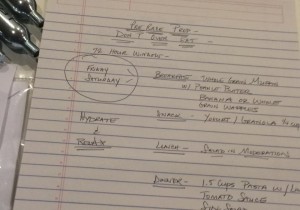I had a client send me his pre-race plan that was given to him by his trainer. He asked me to review and let him know how to adjust it if were not ‘right’. First off, your trainer or coach is usually not a nutritionist or nutrition coach although they may know a bit about nutrition.
Secondly, carb-loading is no longer recommended for your pre-race meal unless you want to start the race fatigued. This has been my experience in the past 12+ years working with athletes. Carbs are your friend, but not in the form of 2 cups of pasta the night before.
Here is the picture of what my client sent me.

I agree, you should not forget to eat. But I would not suggest eating the rest of the plan as mapped out.
Problem 1:
Breakfast is a carbohydrate bomb. Ok, there is a bit of peanut butter which has some fat and protein to slow down some absorption of the sugars, but add the banana…you are adding more carbs to an already high carbohydrate meal. So you spike the blood sugar.
The fix: Add an egg, and eat only half of the bagel or the waffle. Skip the banana entirely.
Or switch to a 2-egg omelet with some veggies in it (spinach, baby bella mushrooms, etc) and make either some home fries or baked red potatoes for breakfast. When warm, they are really good with butter!
Problem 2 – Lunch:
Lunch is just a salad. No protein, no carbs, not fats. Not quite sure what ‘Salad in moderation’ means, but it is not the salad that is an issue (one should be eating their greens even the day before their races. I know if I skip it, I am just plugged up for the race. Not fun!)
The Fix: Add a healthy protein – probably 1/2 cup of chicken or some protein you are used to eating.
Add some carbohydrates like 1/2-1 cup quinoa or white rice or baked potatoes or beets or carrots (or a combination of root vegetables). You could also try half a roll if you can tolerate wheat but I find that wheat is actually difficult to digest, it spikes the blood sugar more than potatoes and can make you sluggish after eating it. Sometimes you may even get brain fog.
Also add some healthy fats to this meal so you can create a balanced meal with adequate protein, carbs, fats and vegetables. Consider adding an olive oil based vinaigrette, avocado, raw nuts or seeds or olives. You don’t need that much but a good tablespoon or two will work well.
These additions will also make the meal last longer so you are not starving 2 hours after just the salad.
Problem 3: Dinner is a carb bomb!
The Fix: Eat less pasta! You should eat about a cup at the most of any grain, not 1.5 – 2 cups.
I would also recommend a grain other than wheat if possible as wheat is hard for many to digest, as is brown rice and you may not only feel plugged up and constipated the next day, but you may feel bloated as well. Not fun race day morning, that is for sure! Try less pasta or grain, or try a baked red potato instead. A sweet potato may work for some as well but for me, the reds or yukon golds are the best options.
Add protein! Again, you don’t need that much, but a good 1/2 cup or 3-4 ounces of chicken would work well here. Not just pasta sauce.
Add a green vegetable! If you are not used to eating a green vegetable with dinner, you can omit this step. But you may want to experiment with adding it as the green vegetables have magnesium and calcium in them which help to alleviate muscle cramping from fatigue.
The reason I mention all these changes is to help your body burn fat, not burn sugar. The more carbs you eat, the more sugar you are consuming, and the body then burns sugar for energy, not its own fat stores. When I work with clients, I help them change the way they eat into a balanced meal approach which helps the body to burn fat. So then the pre-race meals are really just like any other day.
Once you carb load, your body flips the switch even overnight into sugar burning mode.
Who cares? I need the sugar. Well, no, you really don’t. The more sugars your body burns, the more sugars it will need while training and racing per hour….and this is the main reason why athletes have GI distress during a race. They are consuming too many sugars and they cannot be digested while exercising. When mapping out your pre-race nutrition, what you eat the week before and days leading up to the event will have a large impact on how your body uses its fuel during the event.
This client followed my advice, even on short notice and was surprised at the energy he had for his event – never felt tired, had plenty of energy pedal 50+ miles which was his first time riding that far. If he had followed the plan, he would have been hungry most of the ride and fatigued even before starting.
If you want better race results, skip the carb loading and just eat the way you normally eat.

If you want to change the way you eat, now is a good time to set up either a Race Day Nutrition strategy session, or sign up for the Race Day Nutrition or Balance Blood Sugar/Weight loss package.